Feb 19, 09 7:38pm
Legal experts today weighed in on the constitutional crisis in Perak, unanimously agreeing that emergency rule should only be used as a last resort in solving the political stalemate in the Silver State.
Dr Abdul Aziz Bari (constitutional law professor)
The law is clear. The speaker is the man of the House, and the House is exercising its power.
BN, of course can challenge the speaker's decision, but I doubt that they can succeed. The speaker's authority is rarely challenged, even in the United States and Commonwealth countries.
Under Article 150 of the Federal Constitution, only the federal government has the power to declare emergency rule.
It is an open secret that the Perak crisis was orchestrated by the federal government, so we cannot rule out the possibility of an emergency rule in the Silver State.
However, although the federal government has the legal right to impose emergency rule in Perak, it is politically insensible to pursue such a course.
People today have seamless access to information and communication, unlike in 1977 when Kelantan faced its own constitutional crisis. BN's popularity is already waning, and the declaration of an emergency rule will only accelerate their decline.
The federal government must also have the king's consent to declare emergency rule. Though traditionally, the king takes the advice of the prime minister, he also has the discretion to refuse emergency rule as he sees fit.
The cause for an emergency rule can be very wide: it can be triggered by political or economical reasons, and even natural disasters.
At the end of the day, the best solution would be to dissolve the state assembly and hold a snap election.
Both governments must consider the welfare of the people at a time when recession is looming. It seems like BN is more preoccupied about clinging on to power.
Dr Shad Saleem Faruqi (constitutional law professor)
Emergency rule should always be the last resort. Apart from emergency rule, there are three other alternatives that may be pursued to break the constitutional deadlock in Perak, of which the first and most obvious one is to hold fresh state elections.
The second option would be for the House to summon the assembly to session and overturn the decision of the special privileges committee.
The speaker may suspend persons on a daily basis but only the House may suspend persons on a long-term basis, in this case, for 18 months.
Under Article 150 (63-64), the Perak sultan may also consult the Federal Court on the best possible course of action.
Malik Imtiaz Sarwar (human rights lawyer)
The recent happenings in Perak bring into focus on the role of the speaker.
On the surface, it appears that V Sivakumar acted within his powers when he referred Zambry Abdul Kadir and the BN executive councillors to the special privileges committee.
This incident also highlights the separation of powers between the executive and the legislature. While the menteri besar may be the single most powerful person in the executive, in the legislature, it is the speaker who is in charge.
No one, including recently appointed menteri besar Zambry, is above the law.
However, in this scenario, it requires interpretation of the relevant laws including the Perak constitution on whether the speaker had acted ultra vires.
We also have to recognise that our laws, including the Perak constitution, are evolving.
If Zambry and his excos do not want to recognise the suspension, then they will have to file an application to court to seek judicial redress. He can also file a notice of urgency for the matter to be heard as it is of public interest.
Today's situation also sees the important role of the speaker. In the past, speakers were dominated by the (BN-led) executive where they would cut out motions by the opposition.
Now it seems Pakatan Rakyat is falling into the trend in the suspension of elected representatives.
Yeo Yang Poh (former Bar Council president)
The only way to solve the constitutional crisis in Perak would be to solve the root of the problem, which is the failure to expeditiously return the power to the people in Perak to decide who should constitute their assemblypersons.
Apart from holding fresh state elections, there are many courses that both Pakatan and BN can pursue.
For example, the suspended BN assemblypersons may continue to perform their exco functions without attending the state assembly, and Pakatan may continue to file suits against BN and deny the legitimacy of their rule in Perak, but such courses will only lead to more political manoeuvres from both sides.
The only sensible, clear-cut solution to this constitutional crisis would be to hold fresh state elections, and let the people decide once and for all the leaders they want.
Regardless of the outcome of the elections, it is one that all parties will have to accept and there will be no more room for ambiguity.
Subscribe to:
Post Comments (Atom)
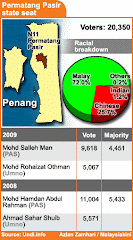

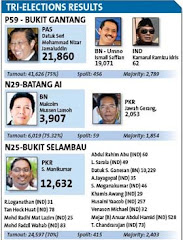

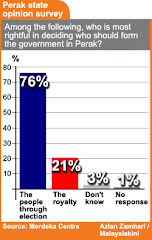
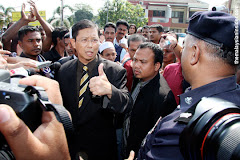
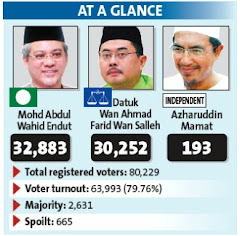


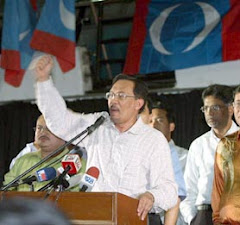



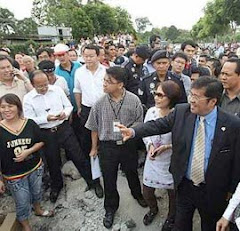
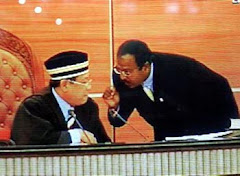


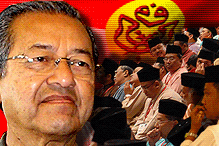

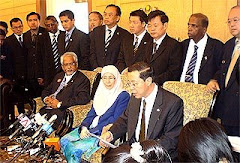
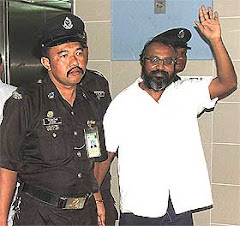
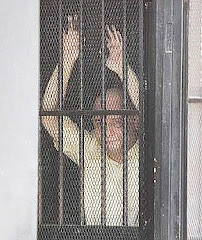
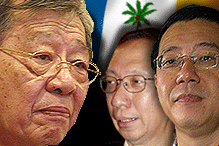

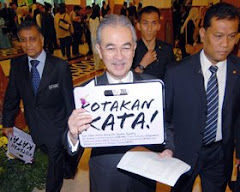
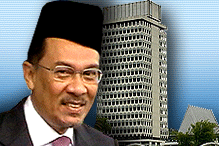
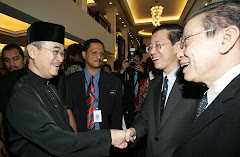






No comments:
Post a Comment